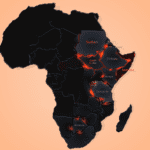Following the collapse of President Bashar al-Assad’s regime on December 8, 2024, the international community has mobilized to support Syria’s transition and reconstruction. The swift takeover by Hay’at Tahrir al-Sham (HTS) has prompted a range of responses, from humanitarian aid to diplomatic engagements, all aimed at stabilizing the nation after over a decade of civil war.
Humanitarian Assistance and Economic Support
Saudi Arabia has been at the forefront of relief efforts, launching an airlift that delivered 350 tonnes of aid to Syria. The Saudi Gazette reported that Ahmed al-Sharaa, Syria’s new de facto leader, acknowledged Saudi Arabia’s role in rebuilding efforts.
Germany has pledged €60 million ($62.70 million) to fund projects focusing on education, women’s rights, and development in Syria. Development Minister Svenja Schulze emphasized the historic opportunity for positive change following Assad’s ouster. The funds are designated for organizations such as UNICEF and Syrian NGOs, ensuring that aid reaches the population directly.
The International Organization for Migration (IOM) has appealed for $30 million to assist nearly 700,000 people in Northwest Syria during the winter months. This appeal underscores the urgent humanitarian needs following the regime’s fall.
Diplomatic Engagements and Policy Shifts
European nations are reassessing their policies toward Syria. The European Union’s foreign ministers are scheduled to meet on January 27 to discuss easing sanctions, contingent upon the new Syrian authorities implementing an inclusive political transition. German Foreign Minister Annalena Baerbock stated that while sanctions related to crimes must remain, rapid relief for the Syrian population should be considered.
Italy’s Foreign Minister Antonio Tajani announced plans to visit Syria to support the country’s transition. Tajani emphasized the importance of equal rights for all Syrians, including minority groups, and suggested that the European Union should reconsider its sanctions in light of the new political situation.
Regional Dynamics and Influence
The power vacuum in Syria has led to a scramble for influence among regional players. Arab states, including Saudi Arabia, Jordan, and Qatar, are providing humanitarian and energy aid to gain favor and counter the influence of rivals such as Turkey and Iran. These nations aim to ensure stability, reduce the flow of drugs and radical fighters, and counteract Turkish dominance in the region.
Final Remarks
Despite these international efforts, significant challenges remain. The new interim government, led by former insurgents, has pledged to establish a pluralist, inclusive political system. However, concerns persist regarding the Islamist roots of the new rulers and their commitment to inclusivity, particularly concerning women’s rights and minority protections. While substantial aid and diplomatic efforts are underway to support Syria’s transition, the nation’s future will largely depend on the new government’s ability to foster an inclusive and stable environment for all its citizens.
















